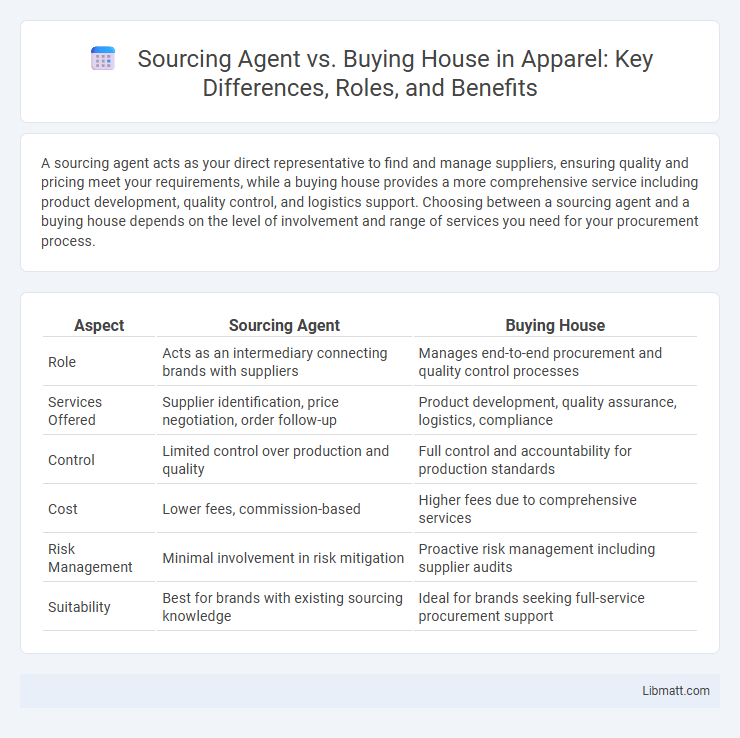A sourcing agent acts as your direct representative to find and manage suppliers, ensuring quality and pricing meet your requirements, while a buying house provides a more comprehensive service including product development, quality control, and logistics support. Choosing between a sourcing agent and a buying house depends on the level of involvement and range of services you need for your procurement process.
Table of Comparison
| Aspect | Sourcing Agent | Buying House |
|---|---|---|
| Role | Acts as an intermediary connecting brands with suppliers | Manages end-to-end procurement and quality control processes |
| Services Offered | Supplier identification, price negotiation, order follow-up | Product development, quality assurance, logistics, compliance |
| Control | Limited control over production and quality | Full control and accountability for production standards |
| Cost | Lower fees, commission-based | Higher fees due to comprehensive services |
| Risk Management | Minimal involvement in risk mitigation | Proactive risk management including supplier audits |
| Suitability | Best for brands with existing sourcing knowledge | Ideal for brands seeking full-service procurement support |
Understanding Sourcing Agents and Buying Houses
Sourcing agents act as intermediaries who identify and vet suppliers, ensuring quality and cost-effectiveness for buyers, primarily in international trade. Buying houses provide a more comprehensive service, managing the entire procurement process from supplier selection to production oversight and quality control. Both facilitate efficient supply chain management but differ in scope, with sourcing agents focusing on supplier discovery and buying houses offering end-to-end procurement solutions.
Key Roles and Responsibilities
A sourcing agent primarily identifies reliable suppliers, negotiates prices, and ensures product quality on behalf of your business, streamlining the procurement process. A buying house offers a more comprehensive service by managing entire supply chain logistics, quality assurance, and vendor coordination to facilitate smoother transactions. Understanding these key roles helps you decide whether a specialized agent or a full-service buying house better fits your sourcing strategy.
Service Offerings: What’s Included
Sourcing agents typically specialize in identifying and negotiating with suppliers, managing quality control, and overseeing shipping logistics to ensure product delivery meets your standards. Buying houses offer a broader range of services, including product development, factory audits, compliance checks, and end-to-end supply chain management. Both provide essential support in global procurement, but buying houses often deliver more comprehensive solutions tailored to complex sourcing needs.
Business Models Compared
Sourcing agents act as intermediaries connecting buyers with manufacturers, focusing primarily on product procurement and quality inspections without managing full supply chain operations. Buying houses offer a comprehensive service model, handling everything from product development and vendor selection to logistics and quality control, effectively serving as an extended purchasing department for your business. Understanding the differences in these business models helps you determine the best partner based on your needs for operational control, cost efficiency, and supply chain management.
Cost Structure and Fees
A sourcing agent typically charges a commission based on the order value, ranging from 5% to 10%, with minimal upfront fees, offering flexibility for small to medium orders. A buying house usually has a more complex cost structure, incorporating service fees, management fees, and sometimes a retainer, reflecting their comprehensive role in product development, quality control, and logistics. Understanding these differences is crucial for businesses aiming to optimize procurement budgets and operational efficiency.
Communication and Transparency
Sourcing agents prioritize direct communication with suppliers, ensuring clear and consistent updates throughout the procurement process. Buying houses act as intermediaries, often managing multiple vendors, which can sometimes limit the transparency and immediacy of information shared with clients. Clear communication and transparency are crucial in both models, but sourcing agents typically offer more personalized and transparent interactions due to their focused approach.
Quality Control Standards
Sourcing agents typically coordinate quality control by liaising directly with manufacturers to enforce specific product standards and inspection protocols, ensuring compliance with client requirements. Buying houses often implement comprehensive quality control systems, including multiple inspection stages and laboratory testing, to guarantee product consistency and regulatory adherence across diverse suppliers. Both entities prioritize minimizing defects and maintaining production benchmarks, but buying houses generally offer more structured quality assurance processes due to their larger operational scale.
Risks and Mitigation
Sourcing agents often pose risks such as limited oversight and potential conflicts of interest, while buying houses may involve higher costs but offer better reliability and quality control. You can mitigate sourcing agent risks by verifying credentials, conducting regular audits, and maintaining clear communication channels. Leveraging the structured processes of buying houses helps reduce risks related to compliance, product defects, and delayed deliveries.
Ideal Scenarios for Each Option
Sourcing agents are ideal for companies seeking specialized product knowledge and direct manufacturer relationships in complex markets, enabling cost savings on smaller, customized orders. Buying houses suit businesses needing extensive supply chain management, quality control, and consolidated logistics across multiple product categories for large-volume procurement. Companies with limited local presence often benefit more from buying houses, while those requiring flexible, niche sourcing excel with sourcing agents.
How to Choose: Key Decision Factors
Selecting between a sourcing agent and a buying house hinges on factors such as the complexity of the supply chain, level of control desired, and budget constraints. Sourcing agents offer flexible, cost-effective solutions for businesses seeking direct supplier engagement, while buying houses provide comprehensive services including quality control, logistics, and inventory management, ideal for companies requiring turnkey procurement. Evaluating the scale of operations, product specialization, and the degree of support required helps determine the best fit for efficient and risk-managed sourcing.
Sourcing Agent vs Buying House Infographic

 libmatt.com
libmatt.com